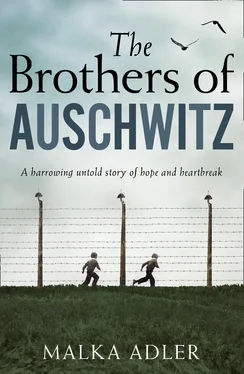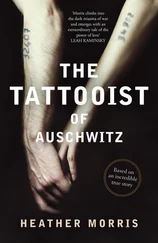We were put in Bloc 12. In the bloc were three-tier beds. Not really beds, more like sleeping benches. We were ordered to stand in a line next to the beds. Avrum and I stood next to each other. Avrum was eighteen and asked where Dov was. I was fifteen and a bit, a year younger than Dov and didn’t know where he was. Avrum was at least a head taller than me. Avrum had broad shoulders and the bristles of a beard. I had room in my shirt at the shoulders and a smooth face with no sign of a beard. In the Bloc were other children my age. They stood among the older prisoners, looking down at the floor. I glanced at my brother, fiercely rubbing the thumb of my left hand. I couldn’t stop rubbing.
An SSman entered the bloc. He stood straight with legs apart and a hat on his head. He stood with one hand on his hip and the other playing on his thigh. He pursed his lips as if whistling and slowly passed from one prisoner to another. Advanced. Stopped. Went back. Stopped at a boy of maybe thirteen, maybe less.
The thirteen-year-old puffed out his chest and belly, made himself taller and taller and taller.
SSman beckoned with his finger.
Boy stepped out of the line. Boy cried quietly. Boy trembled.
SSman hit him on his thigh. Thwack. Boy fell silent.
SSman scratched his neck with the long nail of his little finger. Slowly scratched his bristles. I heard the scratch of sandpaper on a board. He scratched, scratched, scratched, stopped.
I stopped breathing.
SSman pursed his lips. Began to scan us again.
A boy opposite me pinched himself on the arms. I saw him stand on tiptoe. Fall. Stand. Fall. A boy beside me pulled his shirt away from his trousers, as if he’d grown fatter since standing in the line. Someone at the end of the line fell. They dragged him to the boy standing on the side.
SSman took three children and the one who’d fallen and they left.
I didn’t know the crematorium. But I did know I mustn’t go outside with SSman. I understood everything through the crack in his eyelids. I was fifteen and a bit, thin as a match, and it was my great good luck not to go out with them. That was my first stroke of luck. And there was a second stroke of luck. Two brothers from my village saved me. They were in the bloc, two beds away from me. Two large brothers, with swollen muscles in their arms, and bull like necks. The brothers lifted me onto the third tier of the bed.
Covered me with a straw mattress, saying, when there’s appel – counting – you don’t come down, understand, Icho? I stayed on the third tier for four days. SSman came to our bloc every day or two, took small thin prisoners. Avrum gave me bread. Avrum whispered the situation to me from below.
After a week they announced over the loudspeaker: Going to work, not counting. The two brothers from my village didn’t believe the loudspeaker. They told the group, they’re taking us to the crematorium. The two brothers climbed onto the bed and help me to get down. I get down from the third tier and feel my legs fold by themselves. As if they’d been filled with margarine. I held onto the wall and looked at my brother. Avrum grabbed me by the hips and stuck out his tongue. Dragged me to the door. We were the last to leave and I glanced at the fence. An electric, barbed-wire fence at least four meters high. I saw a sign with the drawing of a skull and several words.
Someone behind me whispered, careful, death hazard. I thought, a long time ago, ordinary people walked to and fro behind the fence. What happened to them, are they alive or dead, I had no answer.
SSman shouted, left, right, left, right, in the direction of the train tracks.
Again the crowding in the car. I calculated, if I kill the one in front of me, and the one behind me, and if I kill those to the side, how much room will I have, maybe the length of a ruler on each side, no more. I looked for my brother. I saw there was no point in calling him. He was pressed between two tall people. Pale. I saw his eyelids jumping like a broken automaton.
We traveled for several days. A quarter of bread per day, no water. People around me died without a murmur. They died a purple color, their mouths closed. They had purple under their fingernails. Like iodine poured on a wound. Someone died and we immediately searched him for food. Then we laid him down, while he was still warm, and took turns sitting on him.
There wasn’t enough air in the car for everyone.
Sour sweat dampened our clothing. We stood pressed against one another with our mouths open, we shouted, air, air. We beat on the door. Screamed for an hour. I lost my voice. Finally they opened a narrow strip above. We climbed over the dead and the frail in order to breathe. We climbed on them as if they were our staircase to life.
Through the window I saw we had reached Weimar. There was a prominent sign there. From Weimar they took us to Camp Buchenwald. I knew it from the sign.
We arrived at Bloc 55. The first thing a prisoner with a wounded hand said to me was: careful, they’re looking for children, and in a moment I threw myself onto the third tier of the bunks. The barracks door would open, and I was on top, just as I did at Auschwitz. My brother Avrum told me when to come down. After two days the loudspeaker called my brother Avrum to report. We knew by the number they called.
Avrum came to say goodbye but in the end he said nothing. He looked at me and trembled. His face was white as a sheet. I fell upon him, oy, oy, oy, it’s a mistake, they mistook the number, don’t go, Avrum, don’t leave me alone. Tears wet Avrum’s shirt. The trembling of his chin increased. His mouth stretched up and to the sides as if he was telling me many important things. He was breathing very fast, and his nose ran like a tap. The loudspeaker called Avrum’s number again. I was afraid. Avrum jumped and hugged me hard. I wept into his ear, I want to stay with you, what do we do, Avrum, let’s go together. Avrum refused. I felt as if both our ribs were breaking, and then he pushed me, breathing in and out, dried my face so I’d see him more clearly, left. I ran after him to the door. The guard at the entrance wouldn’t allow me to leave. He gestured, go back to your place or you’ll get it. He had a baton in his hands. A baton with an iron knob at the end. I wanted to shout, Avrum, Avrum, wait for me. I opened my mouth wide. Closed it. Went back to my place on the third tier.
I felt myself falling, falling, as if into a bottomless pit. As if they’d tied me to a heavy weight and thrown me into a dark place among strangers. I lay on my bunk and cried for an hour, until they brought a new prisoner to Avrum’s bunk. I immediately turned my back. Couldn’t bear to see someone else beside me. I got down. I knew I was angry enough to kill that prisoner. Two hours had passed and I still couldn’t calm down. A German from another Bloc came into the barracks. I didn’t have time to climb up.
We were ordered: Line up, don’t move. The German half-closed his eyes and scanned us slowly. Back and forth. Back and forth. He had a crooked smile and puffiness under his chin. Like a pocket full of food. His eyebrows were joined like a fence and he had a pointed belly under his belt. He held white gloves in one hand, tapping them against his other hand. As if the gloves were helping him to think. Back and forth, back and forth. I stopped breathing. The German put on his gloves and took me and four other children. I followed him, oblivious to anything.
Outside, the late-afternoon sun was warm, the beginning of summer. Bright light filled the spaces between the blocs. I searched for Avrum in that bright light. Examined the parade grounds. I saw trucks with tarpaulins. I didn’t know if there were prisoners inside or if they were empty. I never saw Avrum again, never saw him again.
Читать дальше












